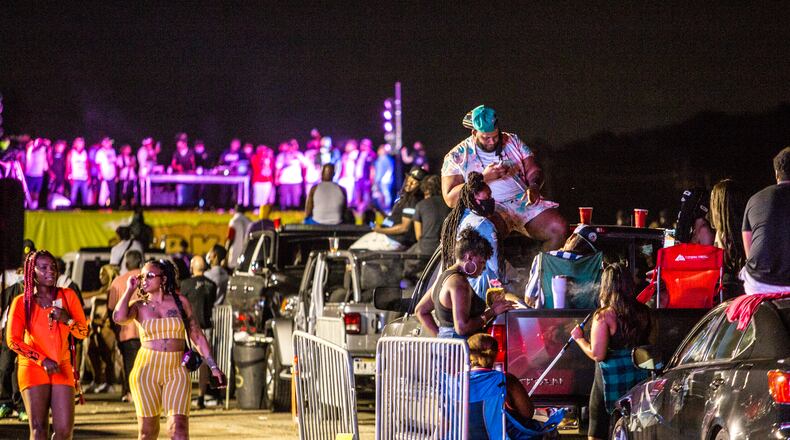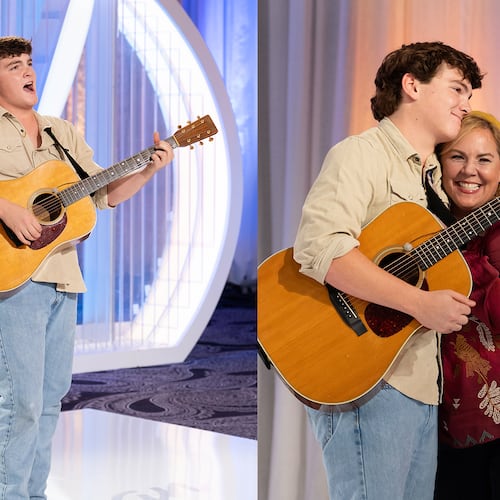In March, music fans looked toward August as the finale for a record number of stadium concerts in Atlanta.
Following scheduled mega-shows from artists including The Rolling Stones, BTS and Kenny Chesney, this month would have been capped with massive productions at Truist Park and Bobby Dodd Stadium by the Zac Brown Band, Green Day with Fall Out Boy, Motley Crue with Def Leppard, and Guns N’ Roses.
Then the coronavirus pandemic obliterated the live music business.
Everyone from agents to musicians to publicists to venue owners to ticketing sites froze, suddenly in the unprecedented position of having zero control over the future of a steadily humming, multi-billion-dollar industry. (Concert industry trade publication Pollstar estimates about $9 billion will be lost this year.)
Instead of experiencing 10 scheduled stadium concerts, all of Atlanta’s genre-spanning festivals, dozens of amphitheater and arena shows — many of them from artists such as Alanis Morissette, The Black Crowes, Kraftwerk and My Chemical Romance celebrating landmark albums, reunions or milestone anniversaries — those accustomed to sharing communal energy, sweat and singalongs in packed venues were relegated to clicking a link for an isolated livestream experience.
No doubt, the number of artists who bounded online to connect with fans, whether to earn money for themselves or their unemployed crews or simply due to aching boredom from the inability to tour, impressed normal concertgoers.
Whether you wanted to watch the Indigo Girls play song requests on Facebook, Nelly battle Ludacris on the Instagram Live series “Verzuz,” or tap into livestreams originating from area venues, including Eddie’s Attic and City Winery, some form of live entertainment existed.
But any music devotee will tell you that while the online intentions are appreciated, it’s a comparatively mundane experience.
Credit: Jenni Girtman
Credit: Jenni Girtman
By mid-May, David Leeks and Allen Parks of the Atlanta-based artist management Street Execs, who previously guided the phenomenon that became 2 Chainz’s Pink Trap House, turned their own restlessness into a productive outlet. They produced an “activation” for local rapper Skooly — his album release event — at the Starlight Drive-In. The event was free, Skooly’s appearance was distanced from rows of parked cars, and the music was tuned in through FM modulators.
“We looked at the energy and the turnout and the idea kind of manifested,” said Parks. “We all had missed the performance energy and since we figured out how to do the social distancing, we had to add another layer to the artistry.”
A few weeks later, the inaugural “Parking Lot Concert Series” was staged at Murphy Park Fairgrounds in Southwest Atlanta. Since then, a parade of hip-hop names including Travis Porter, Young Dro and rap kingpin Rick Ross has performed at the fairgrounds for capacity crowds of 300 cars (an estimated 600-700 people attend each week).
Tickets typically cost $50-$60 per person, which includes general admission parking; a guaranteed VIP spot closest to the stage is an additional $150 per car.
Street Execs readily acknowledge that they aren’t concert promoters, but, said Parks, “It’s not a money thing for us. It’s about providing an experience and keeping our brand alive. It’s our priority that everyone has a safe, fun time.”
Ah, yes, the safety protocols that have infiltrated everyday life for the foreseeable future.
Following the Skooly event, Leeks said he noticed many attendees not wearing masks. So Street Exes teamed with the non-profit Until We Do It, an organization that delivers protective supplies to those most at risk of contracting COVID-19, to hand out masks to all attendees. (Masks are required if leaving your car.)
Ordering food is done virtually to ensure minimal contact and, while fans can sit or stand on their cars, they’re restricted to their own self-contained area.
“We want to make sure that whatever your comfort level is, we’re going to adhere to that,” Leeks said.
Feeling the energy
The Atlanta “Parking Lot Concert Series” — which Street Exes say will soon expand beyond hip-hop acts as it continues through Labor Day weekend — mirrors similar musical compromises being staged across the country.
Concert promoter Live Nation has hosted its “Live from the Drive-In” at a handful of venues outside of Indianapolis, Indiana; St. Louis, Missouri; and Nashville with artists such as Brad Paisley and Darius Rucker. Atlanta-based Yacht Rock Revue was tapped to kick off the July drive-in shows in Noblesville, Indiana, with a performance stocked with breezy hits from the ’70s and ’80s.
Georgia-born Alan Jackson was an early adopter of experimenting with a full-scale concert performed for fans in cars when he played for about 2,000 vehicles in rural Cullman, Alabama, in early June.
The shows — a second was held in Fairhope, Alabama — were presented by Premier Productions, a veteran promoter that highlights faith and family events for artists such as Hillsong United and Kari Jobe, as well as the annual Winter Jam Tour Spectacular.
Credit: TNS
Credit: TNS
Co-owner Shane Quick said he was apprehensive about how the crowd would react — and interact — at Jackson’s shows, especially since musicians feed off the energy of an audience.
“Music artists aren’t actors. They vibe and feel, like a comedian would with the timing of a clap, or people singing along. But once the show started, the energy in the area was one that I recognized. People did not have to be elbow to elbow, and it was the same feeling,” Quick said.
But even socially distanced concerts involving the barrier of a parked car aren’t immune to the coronavirus threat.
Premier Productions planned a trio of outdoor concerts for contemporary Christian singer Chris Tomlin — co-founder of Buckhead’s Passion City Church — to coincide with the release of his “Chris Tomlin & Friends” album.
Among the stops was a July 26 show at The Rock Ranch in Upson County. But a little more than a week out, the “Worship Tailgate” tour was canceled, with the continued escalation of COVID-19 cases as the culprit.
Tomlin, in an interview before the cancellation, expressed anticipation about performing his first live shows since the lockdown began in March.
“I think it’s going to be so cool. I just hope that you’re still seeing people and not just looking at windshields. I’ve played many thousands of concerts outdoors, but nothing like this,” he said. “But I like this idea because, for me, the biggest struggle going to concerts is finding parking and getting to my seat, and to think, hey, it’s all right there!”
Despite the nixed Tomlin dates, Premier Productions intends to stage — with cautious optimism — occasional socially distanced shows through the fall.
“We feel this is the lane we’re going to stay in for a while,” Quick said. “One thing we’re talking about is that there’s probably nothing more important for American entertainment than football. I say if college and the NFL don’t have fans (in the stands), I don’t know what that’s going to do for concerts. That will be a tipping point for us. (Football) will show the world, ‘Here’s how we can do it safely.’”
Credit: 8 Ten, Inc.
Credit: 8 Ten, Inc.
Going to a theater — drive-in style
For those who want a tingle of a live music experience but aren’t adamant that the performer be present, event production and marketing company Encore Live offers another option.
In late June, Garth Brooks “performed” for more than 350,000 fans nationwide during a one-night-only live concert beamed into drive-in movie theaters, including a handful in Georgia.
The show, pre-recorded days earlier in Nashville specifically for the event, cost $100 per car or truck.
Brooks, who called the outing “old school, new school and perfect for the time we are in,” was played on more than 300 screens in the U.S. and Canada.
Encore Live followed that success with another pre-taped show from Blake Shelton, Gwen Stefani and Trace Adkins on July 25. That concert special, which landed at the Starlight Drive-In, the Tiger Drive-In and Albany Civic Center, presented a price tag of $115 per vehicle, for up to six people.
The company is insistent about adhering to safety protocols as dictated by the Centers for Disease Control and Prevention, including staff wearing personal protective equipment and enforcing space of at least six feet between cars. Contactless payment, guidelines around concessions and limited capacity in restrooms were also enforced.
For some, the drive-in theater shows, even though neither live in person nor on screen, provide a reason to experience a change of scenery and shared excitement — even at a distance.
Others might consider it no different than watching a very expensive concert video on a large screen and continue to revel in livestreams, sans a crowd, at home.
For those who are tiring of the ubiquitous artist events online, at least some are testing their creative boundaries.
Credit: KGC-138/STAR MAX/IPx
Credit: KGC-138/STAR MAX/IPx
Chris Daughtry is putting a spin on the concert-from-the-basement approach with a virtual tour dubbed “Live from Home.”
Starting Aug. 12, the musician will play 19 different acoustic concerts for 19 cities, including Atlanta on Aug. 27. In each market, Daughtry, in partnership with On Location Live, picked an independent venue and staff as the beneficiary of the virtual performance; in Atlanta, it’s the Fox Theatre.
Geofencing technology ensured that only fans within a certain distance would have access to buy tickets, as the shows will be customized for each market with song requests and a Q&A session.
According to a representative, Daughtry hopes to expand the virtual tour worldwide and also encourages other artists to engage in a similar online outing to assist venues around the country.
Even though no one knows what the rest of 2020 will look like for live music, at least there is the certainty of options.
About the Author
Keep Reading
The Latest
Featured








